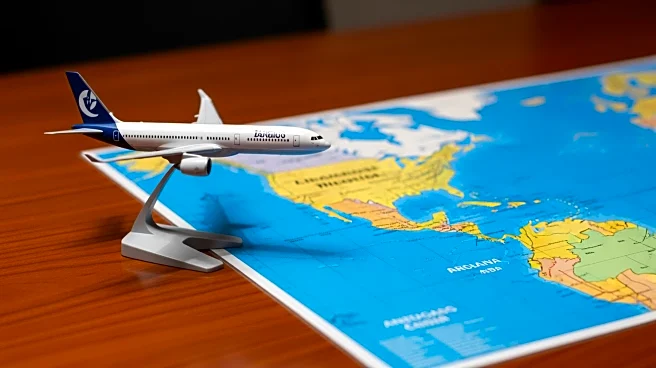What's Happening?
House Republicans have announced they possess the necessary votes to conclude the longest government shutdown in U.S. history. A vote is scheduled for today, which could potentially send the bill to President
Trump's desk by nightfall. Concurrently, the Federal Aviation Administration (FAA) has issued warnings that flight disruptions will persist even after the government reopens due to ongoing air traffic controller shortages. In a separate development, the U.S. has deployed its largest aircraft carrier, the USS Ford, to the Caribbean, a move that is escalating tensions with Venezuela.
Why It's Important?
The resolution of the government shutdown is crucial for restoring normal operations across various federal agencies, which have been hampered by the lack of funding. The aviation sector, in particular, faces significant challenges as air traffic controller shortages threaten to disrupt flight schedules, impacting both domestic and international travel. The deployment of the USS Ford to the Caribbean signals a strategic military maneuver that could influence geopolitical dynamics in the region, particularly in relation to U.S.-Venezuela relations. These developments have broad implications for U.S. politics, international relations, and economic stability.
What's Next?
If the House successfully passes the bill, it will be sent to President Trump for approval, potentially ending the shutdown. The FAA will need to address the air traffic controller shortages to mitigate ongoing flight disruptions. The deployment of the USS Ford may prompt diplomatic responses from Venezuela and other Caribbean nations, potentially leading to further military or political actions. Stakeholders in the aviation industry and international relations will be closely monitoring these developments.
Beyond the Headlines
The government shutdown has highlighted vulnerabilities in federal operations, particularly in sectors reliant on continuous funding, such as aviation. The deployment of the USS Ford underscores the U.S.'s strategic interests in the Caribbean, which may have long-term implications for regional security and diplomatic relations. These events may also influence public perception of government efficiency and military strategy.











